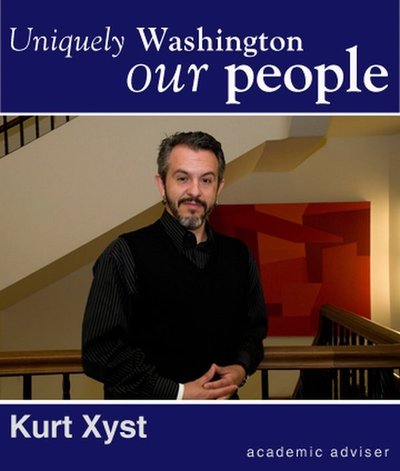June 5, 2008
Facing sophomore slump: Adviser has been there
Kurt Xyst is one adviser who knows firsthand about the challenges students face. He dropped out of college on his first try, and he didn’t pick up his degree until 11 years after he’d started.
“I came into college right out of high school and had no idea what I was doing,” Xyst remembers. “I did not know how to do college. It was during my second year that I decided it wasn’t worth it. So I left for six years and figured out what I cared about.”
That was at the University of New Mexico in Albuquerque, where he grew up. After dropping out, Xyst spent time in a variety of jobs, mostly in restaurants and music stores, and cultivated a deeper interest in the big ideas of philosophy and religion. When he realized he needed help in pursuing those interests further, he went back to school and had a very different experience from the first time.
“I had motivation, I had a focus. I knew why I was there, and I did great,” he says.
He graduated with a degree in philosophy, and then came to the UW to pursue a master’s in education. He applied to work as a graduate student assistant at the Gateway Center — the advising center for premajor students — simply because he needed a job.
“I interviewed and got really intrigued by the work,” he says. “Then after about 48 hours of actually doing the work, I realized that this is exactly what I was looking for. It is teaching, but I get to do it one on one.”
He served as a graduate student assistant for two years, then was recruited to help build the individualized second year advising program — a new program for sophomores. Which sort of brought him full circle — advising students at the critical juncture where he chose to drop out all those years ago.
Moving from freshman to sophomore year is, according to Xyst, a big leap. As freshmen, he says, students are mainly concerned with survival issues — will they find friends, can they take care of themselves away from their families. But around the end of the freshman year, they take a look at their grades and begin to think more seriously about their future.
Xyst teaches a class for third-quarter freshmen that centers on questions such as: Where do I go from here? How do I make next year productive? How do I make good choices next year? What does next year mean in the big picture?
He’s become so intrigued, in fact, by the questions college sophomores face that he’s developed a few questions of his own that he intends to pursue as a doctoral student in education, beginning this summer. “I’m thinking about looking at how advising impacts the way college sophomores come to make sense of their education,” he says.
But Xyst is also interested in some broader questions, such as how general education requirements are developed within the context of a research university.
He won’t be leaving the Gateway Center, however; he intends to continue as an adviser while studying for the doctorate. In his life, Xyst says, scholarship and work go hand in hand.
Besides, he still finds the work deeply satisfying. “I get to talk with students right at a transition in their lives that is unique, at a point where they are encouraged/pushed to think about themselves and their role in the world in a way that has never happened before,” he says. “So I have the privilege of talking with students about some of the most consequential and real events of their lives — how they should live, who they are, what they believe in, what kinds of decisions they ought to make, who they are in relation to their family. If I’m lucky enough to be able to work with a student for four years, I have a ringside seat as an individual goes through the process of becoming an autonomous, curious, capable citizen — able to go out into the world and make change, based on things they deeply believe in. That just seems like the best thing ever for someone who’s interested in, not only some big ideas but the impact of those ideas. So it’s a privilege. It’s something I appreciate every single day I’m here.”



